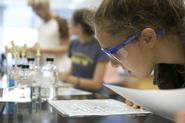
Although classes have ended for the 2007-08 academic year, 118 Hamilton students won't be going home right away. They'll spend at least part of their summer on campus conducting research with Hamilton faculty. Eighty-two students will conduct science research, 18 students will work with faculty on Emerson grant projects and another 18 will study public policy for the Levitt Center.
In the Science Center and in the field, students are already beginning work with faculty from the anthropology, biology, chemistry, geosciences, neuroscience, physics and psychology departments. Projects include "An Exploration of the Power of Enzymes," "Lupine and Butterfly Biology in the Rome Sand Plains," and "The Impact of ADHD Symptomatology in College Students."
Created in 1997, the Emerson Foundation Grant program was designed to provide students with significant opportunities to work collaboratively with faculty members, researching an area of interest. Seventeen faculty members from disciplines as diverse as art, chemistry and Japanese will be working with Hamilton students. This summer's projects include "Romans, Movies and the Disappearance of the Bible; "Why We Need Supermen: The Purpose of Superheroes in Society"; and "The Role of Classics in the Founding of America." The students will make public presentations of their research during the 2008-09 academic year.
To enhance student research around issues of public affairs, the Arthur Levitt Public Affairs Center funds student-faculty research through its Levitt Research Fellows Program. This year 18 students and 16 faculty members will explore such projects as "Theories for Community Integration: Refugees in Utica, N.Y.; "From McDonald's to Chinese Cultural Identity in a Globalization World"; and "A Study of the Global Stock Markets Integration." The program is open to all students who wish to spend the summer working in collaboration with a faculty member on an issue related to public affairs. Students receive a summer stipend and some expense money, and spend 10 weeks in the summer working intensively with a faculty mentor.
Assistant Professor of Government Ted Lehmann worked with a student on an Emerson project last summer, and this summer is collaborating on a Levitt project with Cam Gaylord, a rising senior. Lehmann explained why faculty as well as students benefit from summer research. "The most enjoyable part of being a professor is these occasions of one to one mentoring and research guidance, particularly when it is with students one already likes and has had a relationship with, which is generally the case with summer projects," he said. "Cam's project is close to my own work on oil and politics, and he took a few courses with me last year that kindled his interest in these subjects," Lehmann explained. So my advisement of him is more advanced and his project will likely be at a high level in its final outcome. I enjoy working with students on an individual basis, guiding their research projects along, particularly when the areas of inquiry overlap with my own areas of research interest," he said.
Thirty-two members of the science faculty are sharing their labs with student researchers this summer and many of the faculty are working on more than one project. Professor of Chemistry Tim Elgren, who has conducted research with students for 14 of the past 15 years, says summer is when he gets the majority of his research done. "I've been fortunate to work with some great students in the summer," said Elgren. "I've never limited it to only chemistry or biochemistry majors. I've always invited students that I've come to know, typically because they've taken one of my classes, that I think I would enjoy working with for 10 weeks of the summer."
He describes summer research as "far more intense than during the academic year because every student is pushing forward on a project that invariably presents some troubleshooting. That's the beauty and excitement of mentoring students working on an open-ended research question." Elgren served as president of the Council on Undergraduate Research and as a member of its executive board. CUR is an organization that supports faculty and institutions that seek to promote undergraduate research on their campuses.
Classics Professor Barbara Gold will spend the summer working with Casey Green '09 on an Emerson Summer Research grant project titled "Republican Mothers: A Comparative Study." Green will combine her dual interests (and majors) in classics and history, studying the expectations of motherhood, the relationships between mothers and their children, and how a woman's role as mother influenced her actions in the wider society, in both early America and republican Rome.
Gold noted, "Since I had just published an article on Roman mothers when Casey approached me about doing this project, I was quite excited. This is a chance to combine my love for teaching with my passion for one of my areas of scholarship --Roman social history." Gold said she values summer research, "Because I love to teach, love to work with good students, and love to work intensively on projects that interest me."
